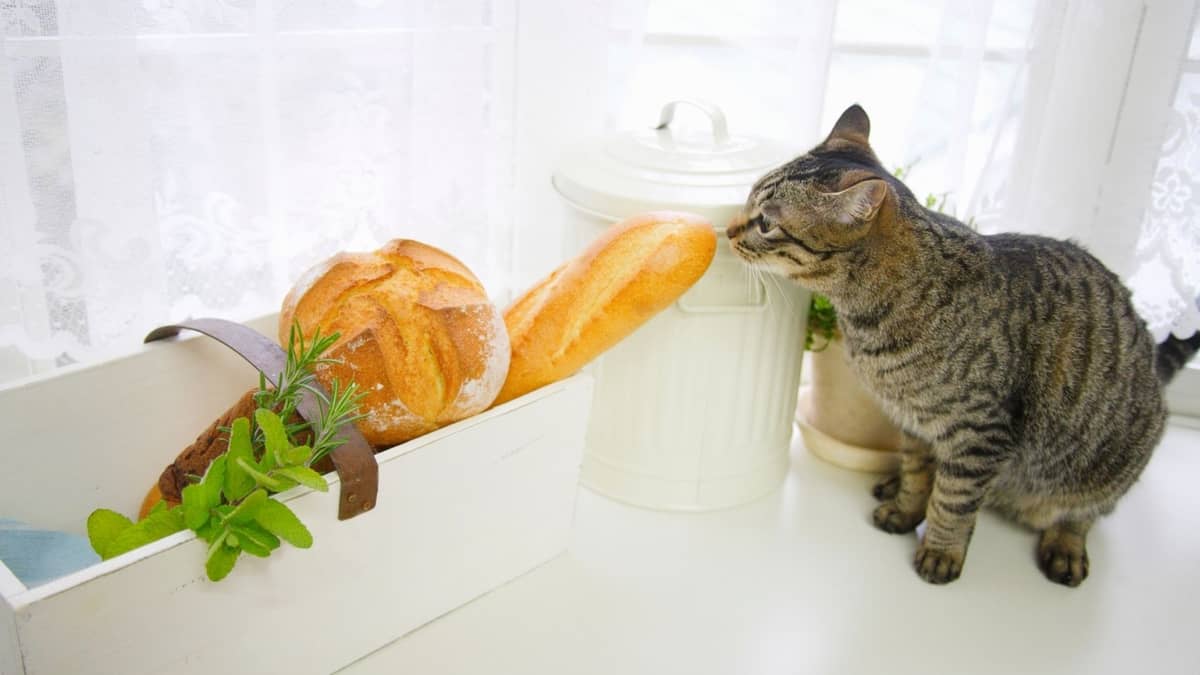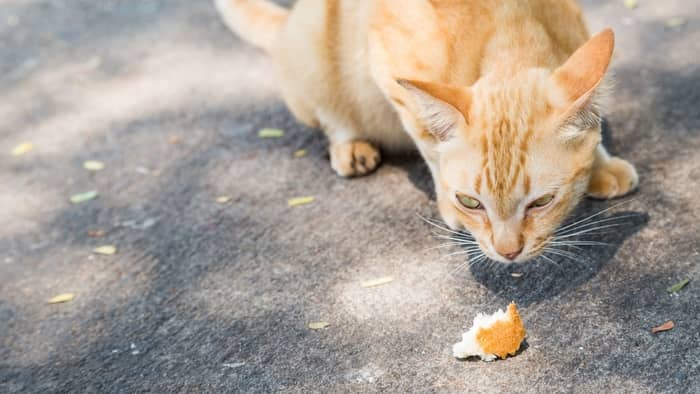A friend recently asked me, “Can cats eat garlic bread?” which made me realize that many people don’t know this answer. If you’re one of them, you’ll find the details here!
Garlic is a vegetable with several health benefits to humans. It’s used to flavor food, and garlic bread is a popular side dish! Whether you’re here because you’ve been tempted to give your cat some leftovers, or you’re about to get a kitten and want to know what’s safe for them, you’ll find the answer in this article.
IMPORTANT: At stuffaboutcats.com, we regularly consult with licensed veterinarians and other industry experts. However, the information found on stuffaboutcats.com should not be viewed as veterinary advice. We do our best to help you better understand your cats, but the information on this blog is not a substitute for veterinary guidance.
Let’s get into it!
Can Cats Eat Garlic Bread?
The short and only answer to this question is no!
Garlic is toxic to cats, even more than onions. When your cat eats it for the first time, they might be fine, and you’ll probably think that it’s okay to give them more. But, feeding your cat garlic can be harmful, and once it enters their bloodstream, it starts breaking down essential cells little by little over time.
Not convinced? Read on to see why you shouldn’t feed your cat any amount of garlic.
The Risks Of Feeding Your Cat Garlic Bread
Unlike many other foods that are toxic for cats, garlic can harm your cat even in small quantities or concentrated forms. If your cat eats garlic, it can develop conditions related to red blood cell damage. These conditions are:
Heinz body anemia
Heinz Body Anemia reduces the number of oxygen-carrying red blood cells in your cats’ body. Signs of this condition include anorexia, lethargy, pale mucous membranes, an abnormal heart rate, rapid breathing, hypersalivation, and abnormal colored urine.
Hemolytic anemia
Hemolytic Anemia is a condition that causes your cats’ body to attack its red blood cells, which prevents them from producing new ones fast enough. When this happens, the oxygen levels in your cat’s body drop rapidly.
Signs of Hemolytic Anemia include lethargy, pale gums, and appetite loss.
Methemoglobinemia
Methemoglobinemia happens when an abnormal amount of methemoglobin is present in your cats’ blood. This causes the hemoglobin to not release oxygen into the tissue.
Symptoms that your cat may have methemoglobinemia include:
- Rapid weight loss
- Excessive salivation
- Diarrhea
- Discolored gums
- Difficulty breathing
- Lethargy
- Passing out
If you spot the signs of anemia early and take your cat to the vet for the proper treatment, there’s a chance that they can be cured. Still, the risk of death is significant when feeding your cat garlic, and it’s one you shouldn’t even consider taking.
Why Do People Feed Their Cats Garlic?
Most people who feed their cats with garlic don’t know of its toxicity. Cats can eat a small amount of garlic and not show any adverse reaction. This falsely makes cat owners believe that it’s okay to feed their cat garlic or foods flavored with it like garlic bread.
Others believe that garlic keeps parasites at bay, and while this might be true, feeding your cats garlic for this benefit is not worth the risk. There are many other safe tick and flea solutions.
Garlic Alternatives For Cats
Garlic is a powerful food that helps fight off bacteria, fungi, parasites, and viruses. Knowing this, you might be tempted to give your cat a tiny piece, but you really shouldn’t! Although nothing compares to the distinctive flavor of garlic, there are cat-safe alternatives that can provide these benefits too.
Seaweed
Seaweed is perfectly safe for cats to eat as a regular treat or as part of their monthly meals. It produces metabolites that can help your cat fight off viruses, bacteria, and fungi.
Yogurt
Goat’s milk yogurt is the healthiest type for cats, and it’s packed with tons of probiotics! You can feed it to your cat weekly, so they’ll build up more than enough antibacterial and antifungal fighters over time.
Several spices
Many cat-safe herbs can inhibit bacterial and fungal growth and keep it from spreading. Herbs like rosemary, thyme, and chamomile will help with this purpose.
My Cat Accidentally Ate Garlic – Help!
The toxicity of garlic depends on your cat’s breed, weight, and any prior health conditions they may have had. If you suspect your cat ate some garlic, don’t panic.
The best thing you can do at such a time is to call your vet for advice. They’ll tell you how serious the situation is, whether there are any signs you should look for and if it’ll be better to take your cat for a check-up.
Ensure that you store your garlic in places your cats can’t reach to avoid any accidents. This includes garlic bread, powder, and soup!
Wrapping It Up
Garlic smells good, and while cats usually dislike it when they get a whiff, your cat might want to explore where the smell comes from. To keep your cats safe, store garlic, powders, soups, and any other foods containing garlic in places where your cat won’t get a hold of it.
The tiniest amount of garlic can be fatal to your cat, and even if they were okay after the first time they ate some, there’s no guarantee that their next bite won’t kill them. Giving your cat garlic is not worth the risk.
Hopefully, you have a clear answer after reading this piece. If you have any questions or comments, leave them in the section below. I’d like to hear about any experiences you have with cats eating garlic and give you answers to any more questions.
Read more about Meat Safety For Cats: Can Cats Eat Cooked Turkey?
FAQs
What happens if my cat eats garlic bread?
While your cat may seem normal after eating a little bit of garlic bread, it's not good for them and may lead to anemia or organ failure.
How much garlic is toxic to cats?
Toxic ingestion of raw garlic is approximately 1 gram per 5 pounds.
Do cats like garlic?
It's possible that your cat won't even look at garlic or anything that contains it since they have a strong sense of smell and hate garlic.
Still, all cats are different, and yours might be one of those who like exploring the taste of weird-smelling foods.


